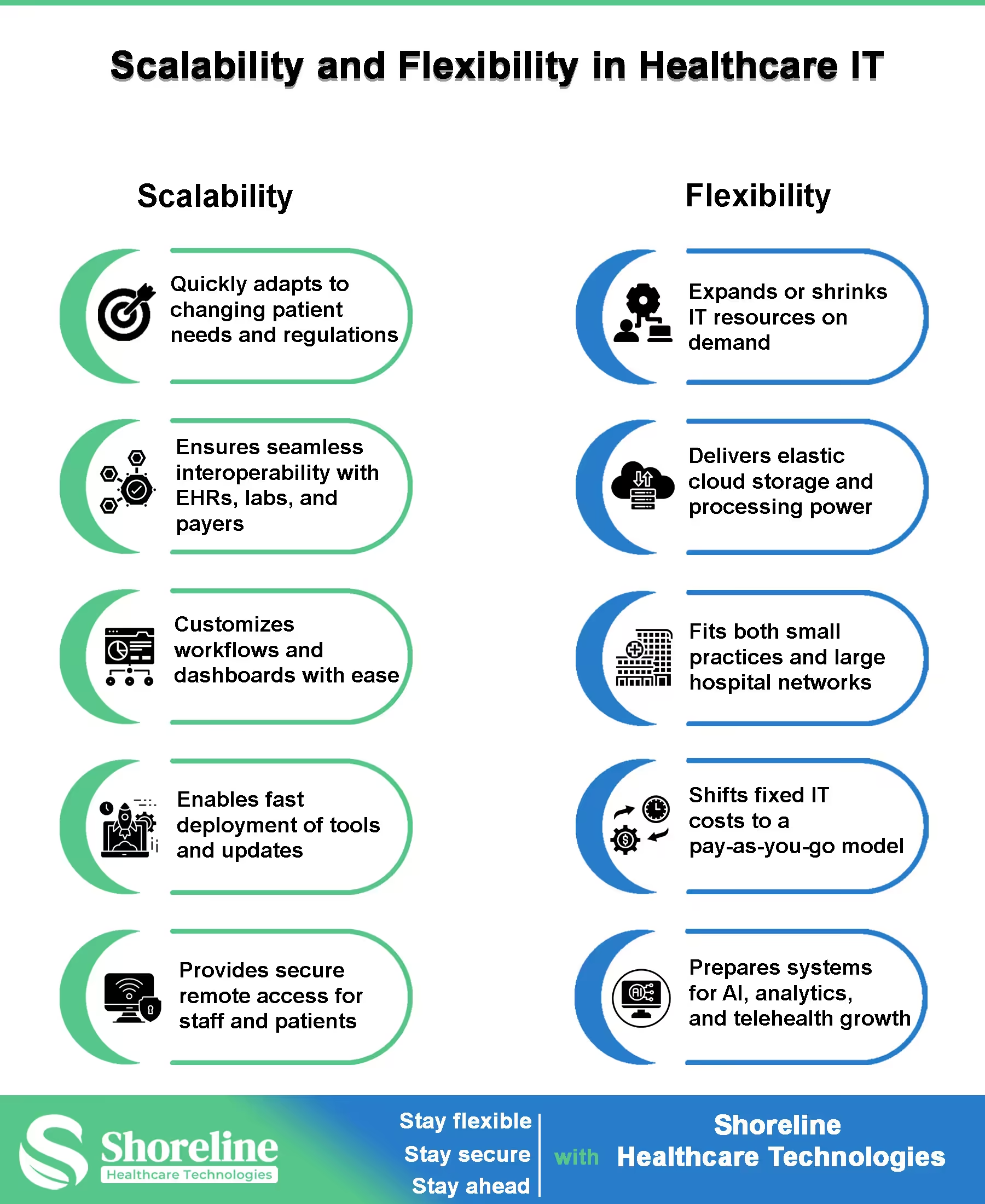Scalability and Flexibility for Growing Healthcare Practices.
For a growing healthcare practice, scalable healthcare IT is the key for expansion. It allows medical practices to expand smoothly, manage rising patient volumes, and adapt to regulatory or staffing changes. By adopting cloud scalability in healthcare, small and growing practices can manage their patient data, billing, and telehealth efficiently, with benefits like cost savings, real-time data access, and HIPAA compliance. Through this post let us find out what exactly does scalable and flexible healthcare technology means and how can it be used to future-proof your practice.
What is Cloud Scalability in Healthcare?
Cloud scalability in healthcare means the ability of cloud-based IT systems to expand or shrink resources on demand to match the needs of a medical practice. Instead of buying and maintaining physical servers, practices can “rent” computing power, storage, and applications from a healthcare cloud provider. This allows to:
- ✔ Add storage quickly (e.g., for medical imaging or patient records).
- ✔ Scale up bandwidth and processing during peak times like flu season or high appointment loads.
- ✔ Scale down resources when there is a lesser demand, so can pay only for what is used.
- ✔ Can connect easily with the multiple locations of the clinic to a centralized system that is secure without complex networking.
- ✔ Providers can add new services, and use advanced technologies, without the need for any extra infrastructure.
What does flexibility in healthcare IT means?
Flexibility in healthcare means adjusting to the changing industry like new regulatory frameworks, increased patient expectations and new treatment models like telehealth and remote patient monitoring. Flexible healthcare technology allows you to:
- ✔ Integrate new tools: Easily connect with a new telehealth platform or a patient scheduling app with an existing EHR.
- ✔ Support remote work: Allowing staffs to access patient records and administrative tools securely from anywhere.
- ✔ Customize workflows: Adjust your software to match the unique way your practice operates.
Scalability is about handling more things of the same type while flexibility is handling new and different things with ease.

Why Scalability and Flexibility Matter for Healthcare Practices?
A growing healthcare practice means not just increase in patients, but managing more data, appointments, and billing without chaos. And the traditional on-premise IT systems, cannot handle this increased pressure. They need systems that can grow with them.
- Patient Volume Growth: Have to handle thousands of new records without system crashes.
- Cost Control: Avoid expensive hardware upgrades during expansion.
- Stay Compliant: Ensure HIPAA-compliant for handling patient data.
- Enhanced Care Delivery: Have to support telehealth and remote patient monitoring.
How to Achieve Scalable & Flexible Healthcare IT?
Using the cloud computing features, we can achieve both scalability and flexibility by moving all core IT functions from an on-site server to a secure, professional data center managed by a cloud provider and unlock the immense potential.
We at Shoreline Healthcare Technologies, specialize in designing scalable healthcare IT solutions that evolve with your practice without adding unnecessary costs or complexity.
Benefits of Scalable & Flexible Healthcare IT
Better Financial Health: Control Costs Intelligently
Cloud scalability gives you the advantage of moving from a capital expenditure (CapEx) model to an operational expenditure (OpEx) model. In CapEx model the bulky and expensive servers and hardware are bought beforehand to hold capacity for the next five years wasting money on unused capacity.
Whereas with the cloud, pay-as-you-go model you pay only for the resources you actually use. It’s like a utility bill and can be adjusted as per our need. This prevents overspending making it budget-friendly and easier for a growing practice.
Enhanced Patient Care and Experience
Cloud systems have lesser downtime and are more reliable than on-premise servers. They allow easy accessibility from anywhere at any time with a secure connection resulting in more efficiency. And provider can focus much on their patients to improve care and outcomes. Due to its flexible nature, you can easily adopt new patient-centric technologies like secure patient portals, book online appointments, and telehealth services. This improves patient engagement and satisfaction.
Ironclad Data Security and HIPAA Compliance
Cloud providers offer high level of physical and digital security measures protecting your data 24/7 against cyber-attacks. Their infrastructure is built with compliance in mind, featuring tools for encryption, access control, and audit trails, which helps you meet your regulatory obligations Most of the cloud companies offer Business Associate Agreements (BAAs) and abide with the strict HIPAA requirements.
Seamless Expansion and Adaptability
You can easily expand your medical practice with the cloud like hiring a new physician, adding a specialty, or opening a second clinic, your IT infrastructure can grow with you instantly. There is no need to buy and set up new servers. Also, its flexible system will allow you to integrate more easily, with the advanced technologies keeping your practice on the cutting edge.
Challenges in Adopting Flexible Healthcare Technology
- Migration of Data will be time-consuming moving years of patient data from an old system to a new one.
- Internet Dependency: Cloud-based systems rely on a stable internet connection.
- Staff Resistance: Some staff members may be resistant in learning a new system.
How can we overcome the challenges of cloud adoption?
We can overcome the challenges of cloud adoption by investing in a reliable, high-speed internet service with a backup connection (like a cellular hotspot) picking up the right cloud partner and highlighting the benefits of cloud computing to the staffs and training to use them.
- ✔ Start with a cloud-readiness assessment – Identify which processes (EHR, billing, scheduling) are best to migrate first.
- ✔ Choose HIPAA-compliant vendors – Verify certifications and track record in healthcare.
- ✔ Prioritize interoperability – Ensure new IT systems integrate with existing workflows.
- ✔ Invest in staff training – Reduce errors and build confidence with new technology.
- ✔ Leverage hybrid models – Combine on-premise with cloud for maximum flexibility.
By embracing scalable and flexible healthcare technology providers can build a more efficient, secure, and resilient practice. We at Shoreline Healthcare Technologies, make cloud adoption seamless, integrating scalable RCM solutions to boost your revenue and simplify growth to provide exceptional patient care today and for years to come.
FAQs
Q1. Will migrating to the cloud disrupt my practice?
+It depends, with a well-planned migration during off-hours, like weekends or overnight, the disruptions are minimal.
Q2. How does cloud scalability help with Telehealth?
+Cloud scalability helps to handle the patient surges in telehealth smoothly and deliver high-quality, reliable virtual care. It also reduces costs by dynamically adjusting resources based on demand.
Q3. Are cloud platforms secure to handle patient data?
+Yes, most of the cloud platforms have in-built advanced security like encryption, multi-factor authentication, and access control to handle patient data more wisely and securely.
Q4. Is ShorelineMB the same as Shoreline Healthcare Technologies?
+Yes, ShorelineMB.com is the official website of Shoreline Healthcare Technologies, a leading provider of medical billing and RCM services.
















Thinking to expand your healthcare operations? Partner with Shoreline Healthcare Technologies for a flexible, cloud-enabled and cost-effective billing support.